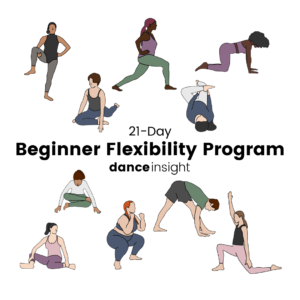
There are two types of moving when you’re a professional dancer:
- Moving temporarily for a gig
- Relocating your home base
This post focuses on the second one: relocating your home base. I was going through this transition as I wrote this post, and I thought I’d share what I learned!
This post will be useful if you are:
- Leaving home for the first time (for college, conservatory, or a long-term gig)
- Moving to a bigger ciy in search of full-time employment as a dancer
- Moving for “life reasons” (family, your job, spouse’s job), and hoping to find a dance community in your new home
- Assessing different cities and deciding which you want to move to
Almost all of the tips in this post are relevant to actors, singers, and other performing genres as well, not just dance! I’m just using dance in all the examples because, well, Dance Insight…
So without further ado, 10 things professional dancers should do before moving to a new city!
1. Audition for Jobs

One good thing that came out of the Covid-19 pandemic is that most entertainment jobs are taking video submissions now. They typically only ask people to come in person for callbacks, so you can apply for jobs before you move! Check out my post on How to Find Dance Auditions for tips on getting yourself out there.
More dance audition tips:
Most Common Tricks at Professional Dance Auditions
10 Minute Warmup for Dance Auditions
2. Update Your List of Audition Links

I keep a Google Doc with links that I want to check regularly for auditions. They’re sorted into categories such as:
- Production companies
- Casting agencies
- Theme parks
- Theaters
- Dance companies
- General audition websites (like Backstage)
- And so on!
As I look for places to audition for in my new city, I’m adding links to everything in those categories that I find. For instance, maybe I come across the website for a theater that has already cast this year’s season. I know I can’t audition for them now, but I’ll want to know when they’re casting for next year. I’ll put a link to their website on my list.
I highly recommend keeping an audition links document like mine, and checking every link at least weekly!
3. Look Up Places to Take Class

Yes, you have to keep taking class as a dance professional! (Here are 8 reasons why.)
Now, this one might be difficult depending on what city you’re moving to. Major cities will have drop-in studios that are geared towards adults and offer all levels up to advanced/professional. For other cities, you might need to think outside the box. Here are some tips for finding places to take class:
- Reach out to “regular” dance studios near where you’re going to be living and see if they let professionals drop in. (Obviously, you have to be comfortable dancing alongside teenagers if you go this route.)
- Search for drop-in classes on apps like Mindbody. You can search Mindbody’s classes without downloading the app if you visit their site on a computer, not your phone.
- Search hashtags on social media such as #adultdanceclasses. You might find studios or individuals who teach drop-in classes.
- Join Facebook groups (see my next point) for dancers and performers where classes might be posted.
If you have trouble finding classes to take, you might have to wait til you move there and ask around. If there still aren’t any good options, you might have to take virtual classes. If you don’t have space to take virtual classes, see point 7 below for tips on finding dance studio space to rent!
4. Join Dancer Facebook Groups

I know, Facebook is cringey and uncool (for good reason, honestly), but it’s still a useful tool for networking as a professional dancer moving to a new city.
Chances are, you’ll be able to find Facebook groups for dancers in your city, or at least your state. Search the Facebook groups tab for “[city name] dancers,” “dance classes [city name],” or “dance auditions [city name].” Join those groups before you move and start keeping an eye on people’s posts. You may also discover new organizations to add to your list of audition links!
5. Follow Relevant Organizations on Social Media

Along the same vein as joining Facebook groups for dancers, you should find and follow companies, organizations, and individuals on social media as well.
- Local dance studios
- Local arts organizations (especially relevant if you have projects in mind that would require grants)
- Production companies and casting agencies
- Dance companies you want to audition for
- General audition posting accounts
- Events that you might want to be a part of (i.e. choreography festivals) or attend
Basically, anyone local to your new city who you think might post an audition or opportunity gets a follow. You can unfollow them later if you decide they’re not a good fit.
Obviously, you won’t be able to find all the important organizations and people in your initial search, but it doesn’t hurt to get started!
6. Spruce Up Audition Materials and Media

It’s a fresh start in a new city. You want to make the best impression you can on the people you meet there. That means taking a look at your resume, website, and public social media profiles to make sure they’re up to date and polished.
Pro tip: wait until you move to your new city to update your headshots! Unless your new city is really close to your old one, you’ll probably need to find a new headshot photographer. Use this move as an opportunity to go ahead and try someone out. (Maybe post in one of those Facebook groups you just joined and ask for recommendations!)
Related post: Do You Need a Website as a Professional Dancer?
7. Look Up Dance Studios to Teach At/Rent

You’re a professional dancer, you’re gonna need to film self tapes. And you don’t want to be scrambling to find a space if you find yourself up against a deadline a week after moving.
Be kind to your future self by reaching out to local dance studios now, before you move. It’s a relatively quick task:
- Go on your maps app and search “dance studios [city name.]”
- Visit the websites of the dance studios that are closest to where you’re going to be living. Find their email address on the contact page.
- Write up a message asking if they allow individuals to rent their space, and if so, what the price would be. Make sure they know you’re not a business, just an individual. Send this email to at least 10 studios. Pro tip: make sure you’re not emailing dance studios at peak times, such as recital or Nutcracker season. You’re not likely to get a response.
- Continue the conversation with those who get back to you. (Not all of them will. Don’t take it personally!) Let them know you’ll reach out when you need to use the space.
Pro tip: Always be very transparent with dance studios about exactly when you’re using the studio, and exactly what you’re using it for. Especially if they trust you with a key. Earn that trust!
If you think you can commit to teaching in the midst of your performing jobs, send your teaching resume to dance studios as well. Send your resume even if it’s not the time of year to hire new teachers! You never know who needs a last-minute replacement or sub. (Twice now I’ve gotten hired by dance studios who had teachers announce they were going on maternity leave right before I reached out.)
Pro tip: Teaching at a dance studio usually means you get to use the space for free!
Looking for a studio for your child? Read: Choosing a Dance Studio
8. Set a Budget

Moving is expensive. On top of that, you’re gonna want to go out and explore your new city. Expenses can add up fast. That’s why it’s important to set a budget for yourself.
Plan ahead of time how much money you’re setting aside for groceries, gas, going out, etc. This is especially important if you’re not moving with a gig already booked. If you’re living off your savings until you get a job, be really really careful. Track your spending. Track your income. It’s no fun, but it’s going to save you so many headaches down the road.
9. Think About Your Side Hustles

We’re performing artists, of course we have side hustles to make ends meet.
Now it’s perfectly fair that you might want to put your side hustles on the back burner until you’re settled in your new place. Give yourself one less thing to worry about. If you’re feeling ambitious, though, moving to a new city is a great opportunity for dancers to take their side hustles to the next level, or find one if you don’t already have one.
Believe me, having a side hustle that can sustain you between gigs is a game-changer. Bonus points if this gig can also travel with you.
If you don’t already have a side hustle that can sustain you between gigs, now is probably a good time to look for one. Think about the benefits you might be able to get from a side job, other than just money:
- Can you work at the front desk at a gym and get a free gym membership?
- Can you work in the box office at a local theater and see shows for free?
- Can you work remotely and keep this job no matter where you move next?
A note on self-employment. Remember that any form of self-employment takes time to earn money from. Blogging? It’s going to be months or years before you have noteworthy income. Same with selling online. Freelance services might do a little better if you’re good at marketing yourself, but you shouldn’t expect to make a significant income with any of these right away. There’s a lot of unpaid work upfront that sets you up for the passive or semi-passive income later. That doesn’t mean you shouldn’t do it, it’s just an important fact to be aware of.
I’ll go more deeply into side hustles in another post. But a transitional time like moving is a good time to rethink your supplemental income!
10. Make a List of People to Reach Out To

I saved one of the most important ones for last.
The performing arts industry is all about who you know. Networking is huge, and will get you farther than talent ever will.
Knowing that, as you prepare to move to a new city, make a list of everyone you know in the industry who lives in or around that area. College classmates, fellow students from summer intensives, people you’ve worked with at previous gigs, and so on.
Plan to reach out to everyone on this list within the first couple months of living in your new city and try to get lunch with them. You’re not doing this to get something out of them, just to reestablish that connection. A future opportunity may come of it, but even if not, you’ll have gotten a great start on making friends in the area.
Now, if you’re early in your career, or you’re moving to a non-major city, you may not know anyone who already lives there. If that’s the case, your networking will begin when you move. Take class, join groups on Meetup, follow people on social media, go to events. Make a definitive effort to establish yourself in the dance community right away.
In Conclusion
There you go, 10 things I’m doing before moving to a new city as a professional dancer! This is the first post in a series where I’m documenting moving to a new city and establishing myself in the dance scene there. Stay tuned for future posts and make sure to follow Dance Insight on Instagram and YouTube!







